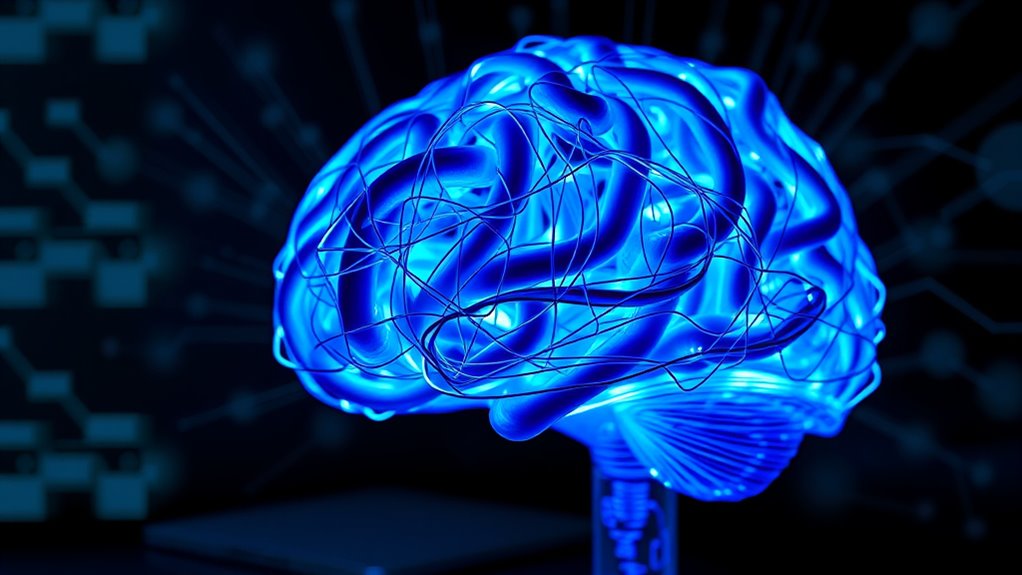Mental bandwidth is your capacity to focus, process information, and juggle tasks without feeling overwhelmed or exhausted. It depends on your brain’s limited cognitive resources, which can be depleted by stress or overload. Recognizing signs like mental fatigue and distractions helps you manage better. You can expand your mental capacity by practicing mindfulness, improving sleep, and breaking tasks into smaller steps. Keep exploring these strategies to boost your mental resilience and stay sharp.
Key Takeaways
- Mental bandwidth is your capacity to focus, process information, and handle multiple tasks efficiently.
- Cognitive capacity is limited and influenced by neural mechanisms, but can be expanded through learning and neuroplasticity.
- Signs of overload include mental fatigue, distraction, memory lapses, and emotional intensity, indicating need for resource management.
- Strategies like mindfulness, sleep optimization, and regular breaks help boost and sustain mental energy.
- Managing cognitive load involves prioritizing high-impact tasks, breaking work into manageable steps, and reducing distractions.
What Is Mental Bandwidth and Why Does It Matter?

Mental bandwidth refers to your capacity to focus, process information, and handle multiple tasks at once. When your mental bandwidth is low, you might experience brain fog, making it harder to think clearly or stay alert. Decision fatigue also kicks in, leaving you drained after making numerous choices throughout the day. These signs show that your cognitive resources are depleted, affecting your productivity and well-being. Understanding what mental bandwidth is helps you recognize when you’re pushing yourself too hard. Managing your mental bandwidth is essential because it influences your ability to think critically, make good decisions, and maintain mental clarity. High cognitive load can further diminish your mental resources, emphasizing the importance of proper task management. Prioritizing tasks and taking breaks can help preserve this important resource, keeping you sharp and focused throughout the day.
The Science Behind Cognitive Capacity

The brain’s ability to process information and handle multiple tasks relies on a limited resource known as cognitive capacity, which is governed by complex neural mechanisms. Neuroplasticity enhancement plays a key role, allowing your brain to reorganize itself in response to learning and experience. This adaptability helps strengthen neural pathways, boosting cognitive resilience—your ability to recover from mental setbacks and maintain focus. When you challenge yourself with new skills or information, you’re actively engaging these mechanisms, expanding your cognitive capacity over time. Understanding the science behind this process shows that your brain isn’t fixed; it’s malleable. By fostering neuroplasticity and resilience, you can optimize mental bandwidth, improving your capacity to think clearly, learn faster, and adapt more effectively to life’s demands. Additionally, Kia Tuning techniques, such as ECU remapping and suspension upgrades, exemplify how targeted modifications can enhance performance and responsiveness, paralleling how mental exercises can boost cognitive function.
Signs of Overloaded Mental Resources

When your cognitive resources become overstretched, you might notice a decline in your ability to focus, think clearly, or make decisions quickly. Signs of overloaded mental resources include mental fatigue, where even simple tasks feel exhausting. Focus distraction becomes more frequent, making it hard to stay engaged. You may experience difficulty remembering details or processing new information. Juggling multiple tasks can lead to errors or missed deadlines. Additionally, emotional responses might feel more intense or disproportionate. Recognizing these signs early helps you understand when your mental bandwidth is overwhelmed. Common indicators include:
- Increased mental fatigue
- Frequent focus distraction
- Memory lapses
- Reduced decision-making clarity
- Emotional irritability
Being aware allows you to take steps to prevent burnout and regain mental balance. Furthermore, just as poor installation practices can lead to heat pump failures, neglecting your mental health can result in decreased cognitive efficiency over time leading to further overload.
Strategies to Boost and Sustain Mental Energy

To effectively boost and sustain your mental energy, adopting practical strategies can make a significant difference. Incorporate mindfulness practices into your daily routine to improve focus and reduce mental fatigue. Even a few minutes of meditation or deep breathing can help clear your mind and enhance resilience. Prioritize sleep optimization by establishing a consistent sleep schedule, creating a relaxing bedtime routine, and minimizing screen time before bed. Quality sleep restores cognitive function and replenishes mental resources, making it easier to stay energized throughout the day. Additionally, taking regular breaks during work or study sessions prevents burnout and maintains mental clarity. Combining mindfulness with sleep optimization creates a strong foundation for sustaining your mental energy and improving overall cognitive performance. Being aware of how mental bandwidth fluctuates and implementing these strategies can help you better manage your mental resources and navigate the noise of modern life.
Practical Tips for Managing Cognitive Load

Managing cognitive load effectively requires you to prioritize tasks and eliminate unnecessary mental clutter. Start by breaking down your workload, focusing on high-impact tasks first. Incorporate mindful breaks regularly to reset your mental energy and prevent burnout. Clear your workspace and digital distractions to reduce mental clutter, making it easier to concentrate. Use task prioritization tools like to-do lists or apps to stay organized and focused. Avoid multitasking, which splits your attention and increases cognitive load. Instead, dedicate uninterrupted blocks to important tasks. Regularly assess your mental bandwidth and adjust your workload accordingly to stay balanced. Additionally, understanding the celebrity lifestyle insights that influence mental well-being can help tailor your mental health strategies. Remember, managing cognitive load isn’t a one-time effort; it’s a constant practice that helps you work smarter and preserve mental clarity.
Frequently Asked Questions
How Does Mental Bandwidth Differ From Emotional Resilience?
Mental bandwidth refers to your capacity to handle tasks, make decisions, and manage stress effectively, while emotional resilience is your ability to bounce back from setbacks and regulate emotions during tough times. When you expand your mental bandwidth, you improve stress management and emotional regulation, making it easier to stay focused and calm. Resilience helps you recover from emotional challenges, complementing your mental capacity and enabling better overall well-being.
Can Mental Capacity Be Permanently Increased Over Time?
Imagine your brain as a muscle that grows stronger with use. Yes, your mental capacity can be permanently increased over time through dedicated brain training and mindfulness techniques. These practices expand your cognitive reservoir, helping you handle more information and stress. Regularly challenging yourself and practicing mindfulness creates new neural pathways, making your mental bandwidth more resilient and adaptable, much like upgrading your mental hardware for better performance.
What Role Does Sleep Play in Maintaining Cognitive Capacity?
Sleep plays a vital role in maintaining your cognitive capacity. When your sleep quality is good, you allow your brain to rest and repair, which keeps your mental functions sharp. Dream analysis can reveal insights into your subconscious, helping you process emotions. Prioritizing restful sleep and exploring your dreams enhance your mental clarity, memory, and focus, ultimately supporting your overall cognitive health and ensuring you function at your best.
How Do Age and Cognitive Decline Affect Mental Bandwidth?
As you age, cognitive decline can reduce your mental bandwidth because your brain’s plasticity decreases. This limits your ability to adapt and learn new skills. However, maintaining strong cognitive reserves through mental challenges, social engagement, and healthy habits can help offset these effects. By actively stimulating your brain, you preserve more of your mental capacity, ensuring you continue to think clearly and adapt despite age-related changes.
Are There Specific Foods or Nutrients That Enhance Mental Capacity?
Like the wise Athena, you can boost your mental prowess with brain boosting foods and cognitive nutrients. Incorporate omega-3 rich fish, blueberries, and nuts to fuel your mind. Leafy greens and dark chocolate also support cognitive function. These foods provide essential nutrients that enhance memory, focus, and mental clarity, helping you expand your cognitive capacity naturally. Embrace these dietary choices to release your full mental potential.
Conclusion
Think of your mental bandwidth as a delicate garden—you’re the gardener tending to your cognitive blooms. When you nurture it with care, your mind blossoms with clarity and focus. But overload can be like weeds choking your growth. By understanding your limits and cultivating strategies to refresh your mental soil, you’ll keep your cognitive garden thriving and vibrant, ready to bloom with creativity and insight whenever you need it most.









